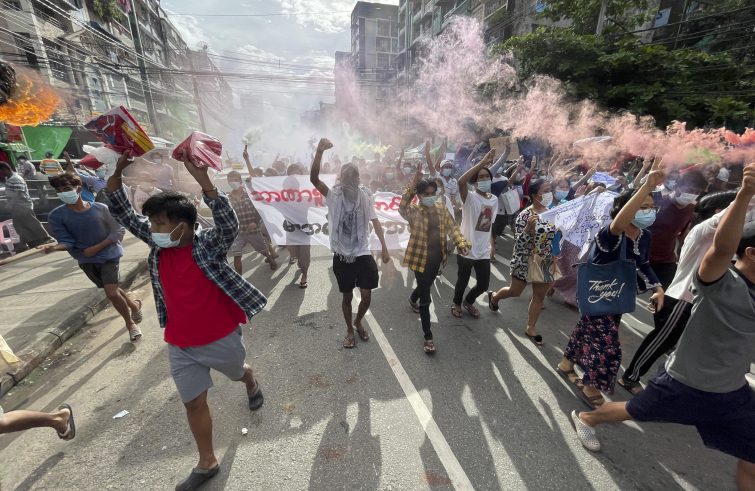
“The sole hope for peace is to bring down the military junta, establish a genuine federal democracy that respects the human rights of the various ethnic and religious groups in the country, and ensure a process of justice and accountability for those who committed these crimes.” Benedict Rogers, journalist, writer and senior analyst for CSW (Christian solidarity worldwide), has a clear perspective on Myanmar’s future. On February 1, 2021, the military junta overthrew the civilian government and seized power. A silent strike has been called to mark this sad anniversary, with citizens asked to stay home from 10am to 4pm and to break the silence by clapping or rattling pots and pans from their homes at the end of the day.
“One year after the coup, Myanmar is mired in a devastating humanitarian and human rights crisis of shocking proportions,” said Benedict Rogers. The Assistance Association for Political Prisoners (AAPP), one of Myanmar’s most renowned human rights organisations, reported over 11,776 people arrested and 1,494 killed. Those arrested include at least 573 members of the National League for Democracy (NLD), 432 of whom are still in prison. Twelve died, including seven who were tortured to death during interrogation. At least 92 people have been sentenced to death.
Both Aung San Suu Kyi and ousted President Win Myint are being detained on bogus charges designed to keep them incarcerated for years.
The Tatmadaw, the self-appointed army of Myanmar, waged more than 7,000 attacks against civilians. At least 100 children were killed. The UN High Commissioner for Refugees (UNHCR) claimed that at least 330,600 people have been internally displaced since the coup. On top of the bombings and land attacks, the Tatmadaw has committed atrocities including murder, torture, sexual violence and rape. On several occasions, the soldiers burned people alive. On Christmas Eve, in a village in Hpruso township, Karenni State, a minimum of 37 people were massacred, including women and some 10 children.
The soldiers tied the victims’ hands behind their backs, forced them into the vehicles and set them on fire, torching them to death. Two humanitarian workers from Save the Children were among the victims.
In Myanmar, everyone is suffering, but Christians have been targeted most severely. Several pastors have been murdered and imprisoned, and many houses of worship have been bombed and destroyed. The United Nations Development Programme (UNDP) has warned that 46% of the overall population will be living in poverty by 2022 and that a minimum of 14.4 million people, including 5 million children, will need humanitarian assistance this year.
Not only democracy but also freedom of the press was destroyed by the coup. At least 114 journalists have been arrested since the coup, 43 of whom are still in prison, points out Benedict Rogers.
According to the Committee to Protect Journalists (CPJ), Myanmar is now the world’s second-worst jailer of journalists after China.
“All independent news outlets have been shut down,” the activist added, “and it has become a very dangerous profession”, to the extent that “the threat of arbitrary arrests and home detention has led an unknown but growing number of journalists to flee the country and escape into exile, including to neighbouring India and Thailand.” The ‘Democratic Voice of Burma’, a local independent media group whose journalists have been arrested, sentenced and released since the coup, is among those reporting in exile.
“The fact that this ongoing catastrophe has not prompted any further protests is astounding,” Benedict Rogers says with indignation. “Except for a few sanctions and statements, the democratic world has been eerily silent, or its voice has been lukewarm at best. It is time for the world to step up and take action.” The writer points the finger at everyone, from governments to the UN Secretary General. Their failure to act “may be partly due to the breadth of challenges they are facing – Covid, Afghanistan, now Ukraine – but these are just excuses”. He adds:
“The UN, notably Secretary-General Antonio Guterres, should do much more than that. They should mobilise a diplomatic effort in the region while simultaneously mandating a global arms embargo and providing immediate humanitarian assistance, especially for internally displaced persons.”










